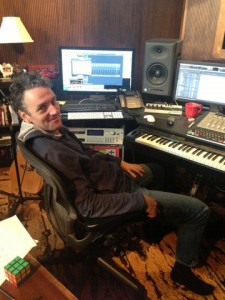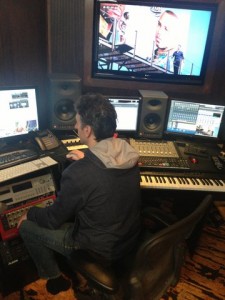
Rob Carli sits in front of a huge TV screen in his home-office.
He is surrounded by instruments—saxophones, guitars, drums, flutes and a clarinet.
Sheet music and vinyl LPs are scattered all over his office, next to computers and keyboards.
On the TV screen, a man is perched high on an overhead billboard, painting graffiti on it. It’s a scene from a new Canadian police drama called Cracked.
Rob watches the man for awhile, and then backs up the scene and plays it again.
There’s something strange about the scene. It seems a little cold, a little unreal. That’s because the scene is missing the music.
Rob is the one who will add the music, and with it the emotion, to the scene.
He’s a music composer for television shows and films. Carli has won five Gemini Awards (which celebrate excellence in Canadian television) and he’s been nominated for six more.
He’s in a bit of a rush right now because, he says, “I’ve got six minutes of music to write before dinnertime.”
It takes about a week of composing and digitizing to add music to a one-hour TV episode.
One of the best-known shows Carli writes for is Murdoch Mysteries, a detective drama set in the 1890s.

The show’s producers typically send Carli a video file that has dialogue but no music with it. He usually receives notes telling him what kind of emotion the producers want him to bring out in the scene. Then, Carli either creates new music from scratch or uses something he has already recorded. He goes scene by scene, adding the music until the show feels the way it’s supposed to.
Carli always thought he’d grow up to become an engineer. But one day when he was in university, a friend asked him to write some music for a film he was making. Carli played piano and saxophone and he agreed to give it a try. The film was a success and Carli hasn’t looked back.
“It’s like that old adage,” he says. “Do what you love and everything else will follow.”
Compare scenes with and without music
Music plays a vital role in adding emotion to a scene. Below are two clips (1:22) from Murdoch Mysteries.
The first has dialogue but no music and only temporary sound effects, and the second one includes music written by Rob Carli.
Watch the dramatic difference between the two scenes.
NOTE: This original TKN article was first posted in 2013. Since that time, it has been very popular with our readers, but — alas — the copyright for the videos expired. However, the producers of Murdoch Mysteries and Rob Carli have allowed us to once again post them, so we are reposting this article for you to use and enjoy. Thanks to Rob, Kristjan and Laurieanne! -Joyce, Jon and Kathleen, your TKN team.
WITHOUT THE MUSIC (JUST DIALOGUE AND SOUND EFFECTS):
WITH THE MUSIC:
CURRICULUM CONNECTIONS
By Kathleen Tilly
Writing/Discussion Prompt
After comparing clips – with and without music – which do you think is better? What kinds of emotions did Rob Carli have to create with his music? How does the music reflect those emotions?
Reading Prompt: Extending Understanding
When Carli receives a video, he has to create music to set the mood and tone of the clip.
What instruments or sound effects could you use for the following scenes?
1. Teenagers exploring a haunted house
2. Kids winning a baseball game
3. A family driving a very long time in the car
4. A little boy learning to ride his bike
5. A snowball fight
Primary
Extend understanding of texts by connecting the ideas in them to their own knowledge and experience, to other familiar texts, and to the world around them (OME, Reading: 1.6).
Junior
Extend understanding of texts by connecting the ideas in them to their own knowledge, experience, and insights, to other familiar texts, and to the world around them (OME, Reading: 1.6).
Intermediate
Extend understanding of texts, including increasingly complex or difficult texts, by connecting the ideas in them to their own knowledge, experience, and insights, to other familiar texts, and to the world around them (OME, Reading: 1.6).
Grammar Feature: Adage
A famous saying (also called an adage) that Rob Carli refers to is: “Do what you love and everything else will follow.”
What do you think this saying means? How does this saying apply to Rob Carli’s life? Can you connect this saying to your own life?







